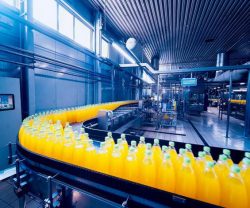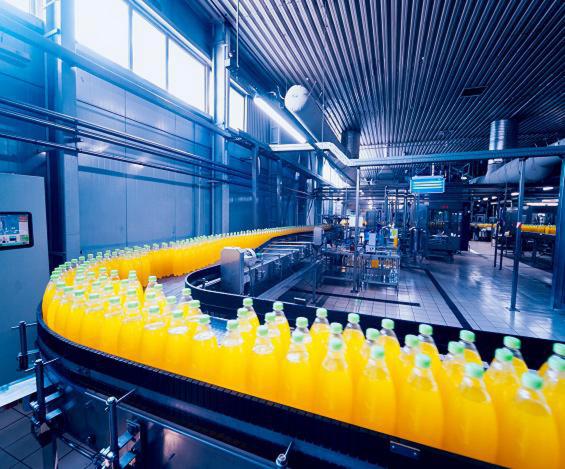In the food and beverage industry, health, safety, and quality are of the utmost importance. The ever-evolving standards of food and beverage safety make it important to ensure your plant is deploying the proper lubricants and cleaners. Not only do you have to meet performance standards, you also have to monitor leakage to ensure that final products are not getting contaminated. We will examine the evolving standards of food-grade lubricants and cleaners as well as the challenges in finding the right products to meet both health and performance standards.
From USDA to NSF
The original designations created by the USDA sought to organize food-grade lubricants into three categories. The current standards are listed below for each category:
- H1 lubricants are used in food-processing environments where there is the possibility of incidental food contact. These lubricants are tasteless, odorless and inert. H1 lubricants are safe for human consumption in small amounts, under 10 parts per million (ppm). They are most often used in for machinery such as conveyors and mixers. Applications of these lubricants include: blending, cutting, bottling, brewing and many more.
- H2 lubricants are used on equipment and parts where there is no possibility of incidental food contact, such as forklifts. Even though there is no contact, H2 lubricants must adhere to strict toxicology standards. H2 lubricants may not contain trace elements of: carcinogens, mutagens, teratogens, mineral acids or heavy metals.
- H3 soluble oils are used to prevent rust on hooks, trolleys, and similar equipment. These products are typically made of edible oils such as: corn oil, sunflower oil or soybean oil. H3 lubricants are inherently biodegradable and comply with 21 CFR Section 172.860 and 172.878. They also comply with 21 CFR 182 and 184 in regards to GRAS substances.
- 3H release agents are used on surfaces with direct contact to prevent food from adhering during processing. These lubricants can be used to aid in processes where contact is unavoidable, such as removing baked goods from a mold.
- HT1 are heat transfer fluids used in primary and secondary heating and cooling systems in food processing facilities. These must comply with 21 CFR 178.3570 and 21 CFR 172.
The USDA served as an authority for approval and compliance. Manufacturers had to prove all components were allowable substances under 21 CFR 178.3570. The USDA stopped issuing registrations on September 30, 1998. Since then, many organizations have adopted and modified these standards.
After 1998, The German Institute for Standardization (DIN) submitted a standard to the International Organization for Standardization (ISO). Eventually the ISO adopted ISO 21469, which pertains to lubricant manufacturing, and ISO 22000, which pertains to food safety systems. However, the most recognized standards are those put forth by the National Sanitation Foundation (NSF).
As a successor to the USDA, the NSF has updated the USDA standards to improve health and safety for consumers. The current NSF standards are similar to the old USDA standards, using the H1, H2, and H3 designations. Additionally, the NSF created the HX-1 standard for ingredients. These HX-1 ingredients are pre-screened and meet requirements for finished H1 lubricants. The NSF has established itself as the recognized international standard and operates in over 80 countries around the world.
Selecting your Food-Grade Product
In the food & beverage industry, health and safety is by far the most important concern. One contamination, recall, or illness outbreak can do irreparable damage to a company’s brand and business. Therefore, it is imperative to consider selecting products that go beyond required standards. Opting to use H1 lubricants is an excellent example of meeting compliance and protecting your brand. This eliminates the possibility of using an H2 lubricant when an H1 is required. H1 lubricants can act as insurance to your brand’s equity and will reduce liability in the event of equipment or plant issues.
Performance is key when selecting a lubricant, but achieving peak performance may be more difficult with food-grade lubricants. H1 products tended to fall short compared to their H2 counterparts. This was due to the limited number of H1-registered additives compared to H2-registered additives (including zinc-based components).
New NSF HX-1 additive packages have dramatically improved the performance of H1 lubricants while also meeting the rigorous standards set forth by NSF H1 lubricants. For grease thickeners, aluminum sterate, aluminum complex, organo clay, polyurea and calcium sulfonate meet H1 standards (lithium thickened greases do not). You can now use an H1 lubricant and achieve the high performance demanded from your business. It simplifies the selection process by allowing you to use H1 lubricants throughout your plant.
These additives are now paired with synthetic base oils such as polyalphaolefins (PAOs), polyalkylene glycols (PAGs), and esters. These base oils along with HX-1 additives can deliver premium performance while protecting the integrity of your brand. Selecting a product also depends on your specific processes and it is important to consider unique contaminants that may affect product performance.
Other considerations may include dietary standards. It is important to ensure your lubricant meets any Kosher or Halal requirements. Failing to do so may result in products not suitable for those whose follow Kosher or Halal diets. This results in a smaller customer base and will affect bottom lines. It could damage brand integrity if a product is marketed as Kosher or Halal and is later found to fall short of these requirements.
Takeaways
Although no government is responsible for food-grade lubricant standards, the NSF has established itself as a leader in food-grade lubricant regulations. Operating as a nonprofit in over 80 countries, the NSF ensures that your food-grade lubricants meet their rigorous standards. Modern advancements in additive technology and base oil technology have led to lubricants that are NSF compliant and meet the highest performance standards. There is no need to sacrifice safety for quality anymore.
Twin Specialties offers a wide-range of food-grade products including lubricants and cleaners. We offer products from Castrol, CRC, Lubriplate, and many more to meet your food and beverage manufacturing needs. Contact us to learn more or get a quote.

